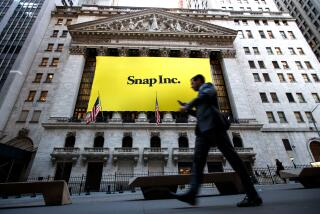Appleâs Woes Deepen as Stock Hits a 10-Year Low
For Apple Computer Inc. Chairman and Chief Executive Gilbert Amelio, the honeymoon is over.
Five months after taking the reins at the troubled computer maker, Amelio is facing an exodus of investors and customers alike: Appleâs share price hit a 10-year low Wednesday, dropping $1.625 to $19.375 on Nasdaq after a market research report indicated the companyâs sales are in a free fall.
Investors were little calmed Wednesday by the appointment of one-time IBM high-flier Ellen Hancock as Appleâs new chief technology officer. Hancock gained wide recognition in the industry in the late 1980s as the top-ranking female executive at International Business Machines Corp., but she was eventually forced out by current IBM Chairman Louis V. Gerstner Jr., who was said to be displeased with her management of the companyâs software and networking divisions.
Hancock later joined National Semiconductor, where Amelio was chairman and CEO before replacing Michael Spindler at Apple in February. Several National insiders said Hancock had a hard time adjusting to the culture of a company many times smaller then IBM.
Amelioâs appointment had ended months of rumors and intermittent discussions about the sale of the company, but the continuing share price decline could yet reignite the interest of potential suitors such as Sun Microsystems Inc. or Oracle Corp.
Amelio had previously warned that Apple would not return to profitability until next year. Analysts project Apple will report a loss of about $139 million on revenue of $2.3 billion for the recently ended third quarter--a sales decline of 11%.
But a market research report disclosed Wednesday appears to indicate that the results could be even worse. Computer Intelligence, a San Diego research firm, said a survey of 1,000 retailers shows that sales of Appleâs Macintosh computer plummeted 31% in April and 33% in May compared with the corresponding months last year.
Computer Intelligence said a separate query of 3,000 companies shows that Macintoshes accounted for 14% of their computer purchases in April, less than half the 38% reported in February.
âThose figures are only U.S. retail so they donât tell the whole story,â Apple spokeswoman Cindy McCaffrey said.
But U.S. retailers are a key constituency: Domestic sales account for about half of Appleâs revenue, with most of them coming from retail. And retailers say a dearth of good news--as well as a scarcity of attractive products--has kept customers away. Appleâs Performa line is sorely in need of a face lift, analysts say, and because of a recent recall, there are few of the popular PowerBook notebooks on dealersâ shelves.
âThings arenât great right now,â said Mark Silverio, marketing director for ComputerTown, an Apple-only retailer based in Salem, N.H. âThey need to generate some positive news to sell machines, and we need machines to sell.â
Micro Warehouse Inc., a Norwalk, Conn., direct-marketing company, announced last month that weak sales of Macintosh computers would drag its second-quarter earnings below Wall Street expectations. And there are rumors that Circuit City, the large consumer electronics retailer, will drop Apple due to the precipitous decline in sales. Circuit City Chief Executive Richard L. Sharp was unavailable to comment.
In April, Apple posted a worse-than-expected $740-million loss for its second quarter, the biggest in the companyâs 20-year history, and laid off 2,800 employees.
Since then, Apple announced that Copland, a critically important new version of its Macintosh operating system software, would be delayed until mid-1997, more than a year late.
âOur industry has a low tolerance for negative publicity and Apple is suffering from this,â said Seymour Merrin, a Palo Alto consultant to the retail industry.






